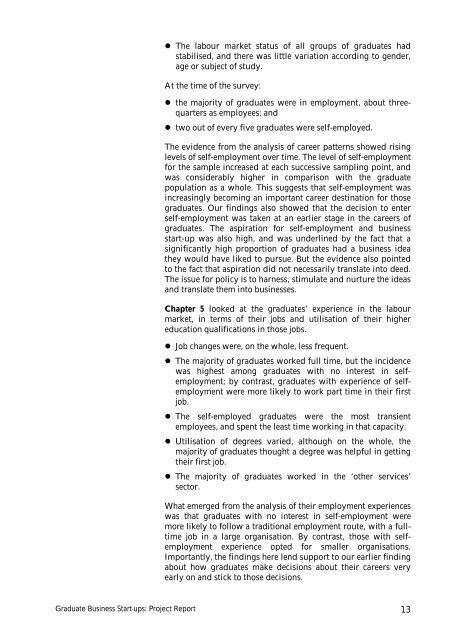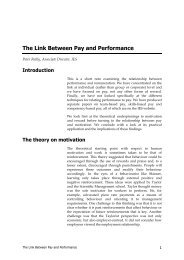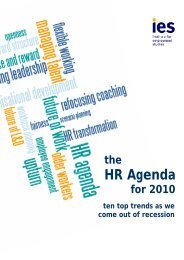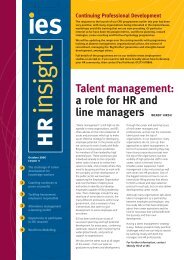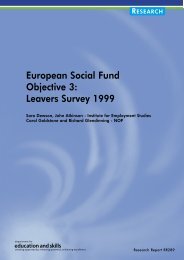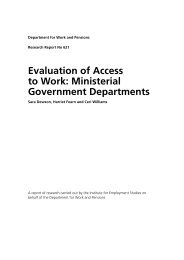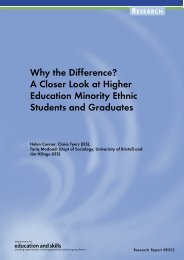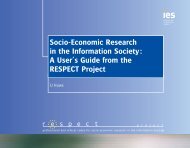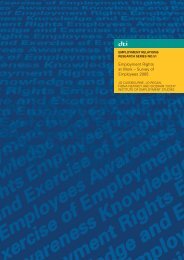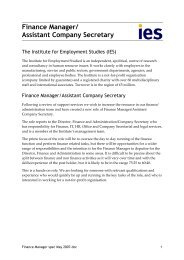Graduate Business Start-ups Project Report - The Institute for ...
Graduate Business Start-ups Project Report - The Institute for ...
Graduate Business Start-ups Project Report - The Institute for ...
You also want an ePaper? Increase the reach of your titles
YUMPU automatically turns print PDFs into web optimized ePapers that Google loves.
! <strong>The</strong> labour market status of all gro<strong>ups</strong> of graduates had<br />
stabilised, and there was little variation according to gender,<br />
age or subject of study.<br />
At the time of the survey:<br />
! the majority of graduates were in employment, about threequarters<br />
as employees; and<br />
! two out of every five graduates were self-employed.<br />
<strong>The</strong> evidence from the analysis of career patterns showed rising<br />
levels of self-employment over time. <strong>The</strong> level of self-employment<br />
<strong>for</strong> the sample increased at each successive sampling point, and<br />
was considerably higher in comparison with the graduate<br />
population as a whole. This suggests that self-employment was<br />
increasingly becoming an important career destination <strong>for</strong> those<br />
graduates. Our findings also showed that the decision to enter<br />
self-employment was taken at an earlier stage in the careers of<br />
graduates. <strong>The</strong> aspiration <strong>for</strong> self-employment and business<br />
start-up was also high, and was underlined by the fact that a<br />
significantly high proportion of graduates had a business idea<br />
they would have liked to pursue. But the evidence also pointed<br />
to the fact that aspiration did not necessarily translate into deed.<br />
<strong>The</strong> issue <strong>for</strong> policy is to harness, stimulate and nurture the ideas<br />
and translate them into businesses.<br />
Chapter 5 looked at the graduates’ experience in the labour<br />
market, in terms of their jobs and utilisation of their higher<br />
education qualifications in those jobs.<br />
! Job changes were, on the whole, less frequent.<br />
! <strong>The</strong> majority of graduates worked full time, but the incidence<br />
was highest among graduates with no interest in selfemployment;<br />
by contrast, graduates with experience of selfemployment<br />
were more likely to work part time in their first<br />
job.<br />
! <strong>The</strong> self-employed graduates were the most transient<br />
employees, and spent the least time working in that capacity.<br />
! Utilisation of degrees varied, although on the whole, the<br />
majority of graduates thought a degree was helpful in getting<br />
their first job.<br />
! <strong>The</strong> majority of graduates worked in the ‘other services’<br />
sector.<br />
What emerged from the analysis of their employment experiences<br />
was that graduates with no interest in self-employment were<br />
more likely to follow a traditional employment route, with a fulltime<br />
job in a large organisation. By contrast, those with selfemployment<br />
experience opted <strong>for</strong> smaller organisations.<br />
Importantly, the findings here lend support to our earlier finding<br />
about how graduates make decisions about their careers very<br />
early on and stick to those decisions.<br />
<strong>Graduate</strong> <strong>Business</strong> <strong>Start</strong>-<strong>ups</strong>: <strong>Project</strong> <strong>Report</strong> 13


